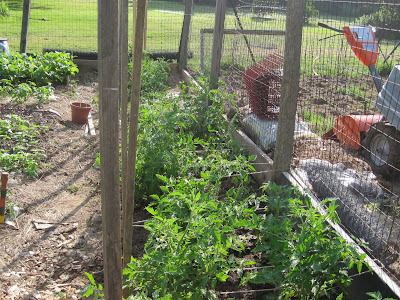I spent the first hour of my day composing a blog post that talked about the three New York Times articles that I read this morning, which had me marveling at how many less-than-adequate decisions, particularly concerning asset use, that we could possibly make. And while I was jumping back and forth to retrieve the links, so that you could read the articles if you were so inclined, I jumped off my blog input screen without saving and lost it all.
I decided to go into the garden after that.
In the garden, I side dressed many of the plants, peppers, onions, zucchini, eggplant, swiss chard, with some beautiful aged sheep's manure. I work around the peas, which I believe have Mosaic, and am moving closer and closer to pulling them out and planting something that will grow for the fall.
There are a few peas on the vine, but it is a tortuous existence for them. I try to convince myself to give up on the small handful of peas that I will pick and value the garden real estate that pulling them will create and plant again.
It's hard to give up on things -- even when they're not working. Perhaps that is something that I have in common with my standout stories of the morning.
http://www.nytimes.com/2011/07/15/science/earth/15frack.html?src=recg
In this story, Joe Martens, new DEC Commissioner says that produced water from hydro-fracking can be treated in our non-hazardous wastewater facilities with minor modifications; the gas industry is concerned that local zoning would actually deter gas drilling in some areas of towns, and that it is estimated that there will be 75,000 wells drilled in the next 30 years.
The next story that caught my eye was
http://www.nytimes.com/2011/07/15/science/earth/15herbicide.html?_r=1&nl...
This story explains how Dupont came up with a new herbicide, Imprelis, that landscape companies are using to kill invasives in grass. Unfortunately, it also disturbs the conifers, which are dying by the tens of thousands. For some of us in New York and California, which has its own review process, the chemical hasn't been used yet because it has been found not to attached to soil, and therefore runs into the groundwater. Additionally, the chemicals do not break down so if you happen to put your grass clippings in your mulch pile and then use it on your flowers and vegetable garden, it will kill those as well.
Lastly, I read about food companies that are making a bit of a fuss about not advertising non-nutritious foods to children and a move to make children's menus more nourishing. The argument centers around whether Goldfish are junk food, but I'm not buying that the argument actually is about nutrition.
http://www.nytimes.com/2011/07/15/business/food-makers-push-back-on-ads-...
Now hours later, from that morning post, I find myself wondering why it is that we have such a hard time cutting our losses and admitting that we can't control and harness the universe for our own self-interest, however benign or not!
Is it the same reason that I cannot give up on my peas as the corporations cannot give up on fossil fuels, manufacture of chemicals and looking at children as the newest marketing group to go after?
Same, perhaps, and different.
Bottom line? the peas have got to go; and the corporations have to start applying themselves to fostering healthy living.






















